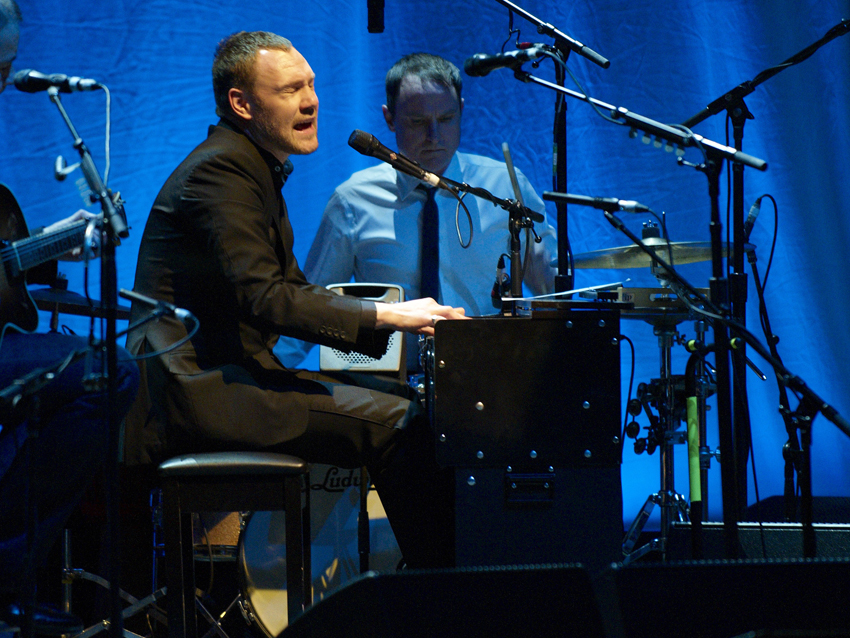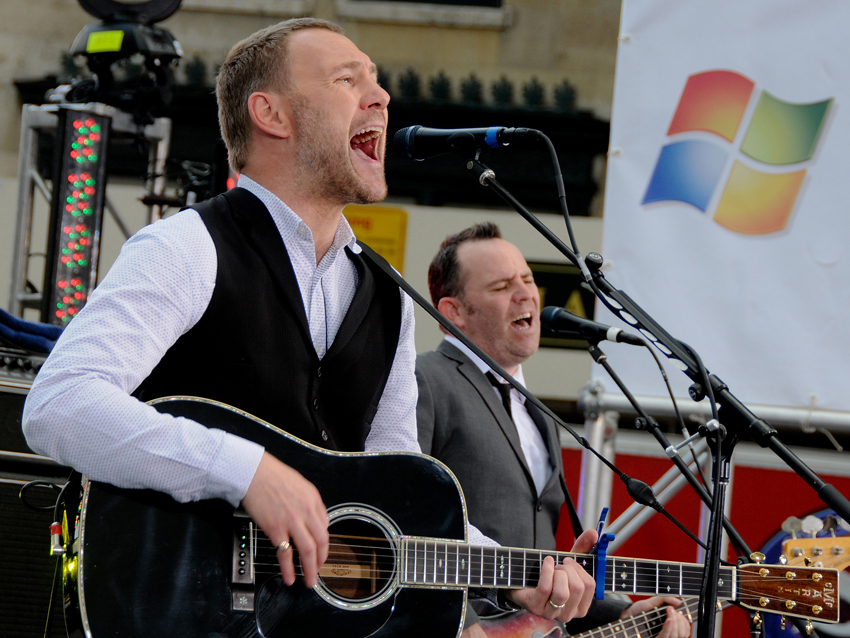
David Gray talks production, atmospherics and his new album, Mutineers
Four years ago, while touring behind his last studio album, Foundling, David Gray started to get fed up with himself. Audiences were still cheering his every move – hits like Babylon and This Year's Love were guaranteed crowd-pleasers, and even the new material was going over well. But the singer-songwriter was feeling a creative restlessness he had never experienced before, and he knew that he couldn't continue as he was.
"I just got tired of the sound of my own voice," Gray explains. "I was bored of the thoughts I was having, the sounds I was making. I didn't want to be the same mildly disenchanted, middle-aged man looking for redemption – the same line of inquiry. I wanted to change it all. So I had to cut off the main road I was traveling on and start off again by foot."
Gray enlisted Andy Barlow, one half of the electronic duo Lamb, as his co-conspirator on the upcoming album Mutineers. Setting up shop in Barlow's home studio, the two threw out much of Gray's tried-and-true ways of constructing songs ("We sort of worked backwards, starting with words and sounds and finding melodies from there," says Gray), and the result is a powerfully sustained piece of metaphysical mood music, one that evokes emotions from luxuriant pulses and textures that propel the singer's still-indefatigable resonant hooks.
Gray sat down with MusicRadar recently to talk about working with Barlow, the joys of happy accidents and why one of his favorite instruments is driving a bandmate crazy.
You don’t operate the same as many traditional singer-songwriters, do you? At least you're not anymore on this record, which is so bathed in atmospherics.
“I think we all work the same lines, but basically it’s one man’s meat is another man’s poison. As an artist, I’m drawn towards sound and the articulation of my ideas rather than the traditional piano-and-guitar thing. I’m looking for something else. I want to hear something I’ve never heard in my music – or anybody else’s – and I found it with Andy Barlow. We created this incredible sonic space, and it’s a wonderful world to be in.”
How did you and Andy hook up? What made you think that he might be the right guy for this?
“It was a real long shot, to be honest. I knew all of the things that I didn’t want to do on this record, but I didn’t know what I was looking for, either. I had a couple of test runs to make the record, but they didn’t work out. Like I said, I was itching to hear something new.
“My manager told me about Andy and how he was getting into the production game. ‘There’s something about him – I think you should meet him,’ he said. So I arranged to hook up with Andy in London, but the night before we were due to meet, he rang me up and said, ‘Dave, I don’t think there’s any point to talking about stuff. Why don’t you just come down to my studio and we’ll do a track? We’ll know straightaway if it’s gonna work.’ I thought, ‘Ah, a man after my own heart. Let’s get in there.’
“I shot down to his house near Brighton, and we worked on a track called As The Crow Flies. We got off to a bit of a difficult beginning, but as we worked through it, things started to really jell.”

On producer Andy Barlow
You and Andy got on philosophically – it wasn't just based around mechanics.
“Well, yeah. The journey here was to work ahead of your conscious mind, the part of your mind that expresses ownership and wants to bolt things down. I was guided by instinct instead of intellect, and that allowed something fresh to develop. These songs are me finding the sounds for the very first time. There was real joy in capturing this magic.”
“It meant changing the basic ways that I do things. Normally, I write melodies and chords, and then I try to find the lyrics. By writing backwards, taking words and trying to find melodies for them, it was exciting, reaching into a void and finding this new lyrical world. It succeeded brilliantly with songs like Gulls, The Incredible, Birds Of The High Arctic – all of them came about from this backwards approach. And then Andy really worked to take me out of my comfort zone. His brief to me was, ‘You’re not going to make the same record you’ve made before.’”
How was a song like Mutineers, the title track, constructed? Did you work from a demo?
“No, that is the demo. I had a song called Sugar Rush – this was all a very turbulent process – and I had a huge stockpile of other songs. Andy would say, ‘I don’t know what I can do with that – or that or that.’ We went through all the songs that I thought would have been the main ones. There were 30 or 40 songs that he didn’t wanna touch. But then I said that I had some ideas, and one of them was Sugar Rush, which was just four or five lines. He said there was something he liked about it, so we decided to work on it.
“We spent half a day putting it down. I put a piano part down, and we found a tempo and the right key. Then I laid down a series of piano parts and some guitar parts. We sat down to listen to it, and one little chord sequence went by and he said, ‘Oh, that’s my favorite part.’ I said, ‘Duh – mine too!’ [Laughs] He said he should lose the verse, lose the chorus that comes after it, but we’d work on that sequence. He just wanted that one bit. I wasn’t so sure – there were some raised eyebrows on my part – but then we took that part, looped it, and off we went.”

Mood music
But still, were you concerned that you were throwing away so much of the song?
“It was terrifying at first ‘cause he sent me into the live room to go for something with just that part. I had nothing, really. Around lunchtime, Andy popped off to see his chiropractor or some nonsense, and I was to work on lyrics. He came back, and by that time I had something. We piled into it. The sound began to develop – I did a MIDI pass of all the piano parts, and he got this toy piano sound and various other things – and I began to let go of my negativity and doubts. I was now intoxicated by the sounds we were finding. The next day, I wrote the lyrics and we got the vocal; then the backing vocals came in. After that, we put on some bass and drums and a bit of percussion. It sounded great.”
Mood is the essence of these songs. Beautiful Agony casts an incredible spell.
“Mood is the secret weapon. It tells you a story, and the lyrics are intertwined with the atmospherics of the sound; the two things become one. The song is already telling you something just by the way that it sounds. Beautiful Agony was another one of those songs that Andy encouraged me to work on. I didn’t have the lyrics, but there was something there, so we set off on a journey to find it.”
Was that the same process for the song Girl Like You? The song keeps changing – it never stays the same.
“Yeah, that’s the dark horse of this record. Live, it’s become this sort of massive thing. It was pretty experimental, particularly how we muted the main vocal. Andy did this reverb thing, but by mistake he dropped the main track into it. When we listened to it, I said, ‘What’s that? I love that!’ Andy said it was a mistake, but I said, ‘No, no, we have to keep it like that.’ We made that the theme of the first verse.
“We were alive to the possibilities and the happy accidents, and I found that really refreshing. Things would happen, and where most producers would say, ‘Oh, that’s wrong. We can’t have that,’ we said, ‘No, that’s cool. Keep it.’ I wanted to get rid of the rules, which is difficult and runs counterintuitive to the responsibility you usually have, which is to do things ‘properly,’ whatever that means. What I found was that by doing things the wrong way, I wound up with the most interesting results.”

His music was played where?
What were your main guitars for this record? Did you use your signature Martin?
“Yeah, I played that one a bit. The main guitar for this was a toy called the Yamaha Guitalele. It retails for about 60 quid or something – 90 bucks. It’s a nylon-string ukulele with six strings, basically. I used that more than anything else, and I also used this German upright piano from the turn of the last century. Those two things were the core sounds of the album. I also used a Martin high-strung dreadnought – it had the Nashville stringing. Oh, and I used my Steinway, too.
“The Guitalele is really interesting. We’ve got this amazing young guitarist in the band, and I’m making him play it. He hates the fucking thing [laughs], ‘cause the intonation is all over the place. He bought this big, posh nylon-string thing, thinking it would be better than the Guitalele. I don’t think so – there’s no character. I love the horrible, twangy sound of the Guitalele. I said, ‘Get the Guitalele back on.’ It’s sort of emasculating to a guitarist to stand on stage with this miniature guitar. It's like, ‘Are we playing Stonehenge tonight?’ [Laughs] You know what I mean?”
I don’t know if you know it, but I hear Babylon as bumper music on various TV shows in the US. Where was the strangest place you’ve heard it?
“Well, I didn’t hear it myself, but a friend of mine told me about how he he heard my music during a pub fight, which is pretty funny to me. It was in this very rough pub in the East Side of London. There was a football match on the TV, and a fight broke out between the two rival firms. It was full-on – glass breaking, people shouting, the whole bit. My album White Ladder was playing on the jukebox. My friend said that Silver Lining or This Year’s Love – some really sweet song – was playing during what looked like this Guy Ritchie film was going on. I like the whole juxtaposition of that. I wish that I could’ve seen it.”
David Gray's Mutineers will be released on June 17. You can pre-order the album at Amazon.
Joe is a freelance journalist who has, over the past few decades, interviewed hundreds of guitarists for Guitar World, Guitar Player, MusicRadar and Classic Rock. He is also a former editor of Guitar World, contributing writer for Guitar Aficionado and VP of A&R for Island Records. He’s an enthusiastic guitarist, but he’s nowhere near the likes of the people he interviews. Surprisingly, his skills are more suited to the drums. If you need a drummer for your Beatles tribute band, look him up.
